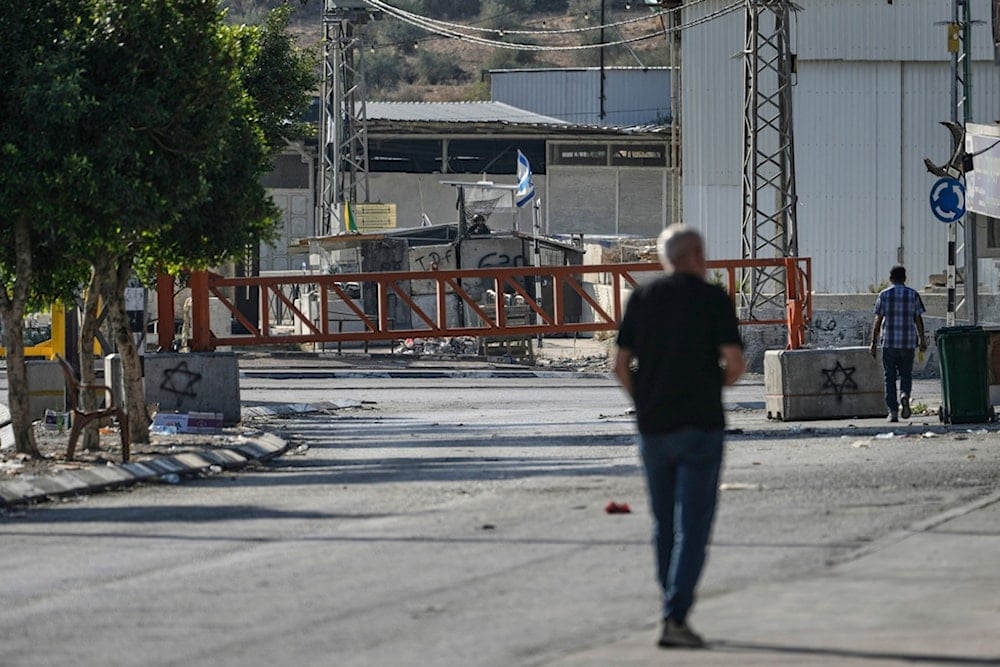IOF turn West Bank's Sinjil into 'big prison' amid ongoing aggression
The residents of the town of Sinjil face isolation as Israeli occupation forces erect fences and checkpoints, cutting access to farmland and disrupting daily life.
-

Palestinians walk by the closed Deir Sharaf checkpoint near the West Bank city of Nablus, Friday, June 13, 2025. (AP)
A towering five-meter metal fence now slices through the eastern edge of Sinjil, a Palestinian town in the occupied West Bank, reducing it to what residents call an open-air prison, Reuters reported on Friday.
All but one route in and out of the town has been sealed by heavy gates and roadblocks, closely watched by Israeli soldiers.
"Sinjil is now a big prison," said Mousa Shabaneh, 52, a father of seven. He watched in despair as the fence was installed across his nursery, where he once grew and sold trees, his only source of income.
"Of course, we're now forbidden from going to the nursery. All the trees I had were burned and lost," Shabaneh indicated. "In the end, they cut off our livelihood."
Read more: Egypt condemns Israeli annexation calls, West Bank violations
Surge in barriers since war on Gaza
Walls, fences, and military checkpoints have long defined life for the nearly 3 million Palestinians living in the occupied West Bank. But since the start of the war on Gaza in October 2023, Palestinians say the number and intensity of these barriers have increased dramatically, leaving many towns under de facto siege.
The fence around Sinjil is one of the most visible examples. The Israeli occupation military claims it was erected to protect the Ramallah-Nablus highway, citing "recurring terror incidents."
Residents trapped and cut off from their land
Residents are now forced to traverse narrow, winding streets to the only permitted exit. Many walk past blockades on foot to reach parked cars. Bahaa Foqaa, Sinjil’s deputy mayor, said 8,000 residents are confined to just 10 acres of space, fenced off from 2,000 acres of their privately owned land.
"This is the policy that the occupation army uses to intimidate people and break the will of the Palestinian people," he said.
"Israel" justifies these actions as protective measures for settlers in the occupied territory. Israel Gantz, head of the Binyamin Regional Council overseeing 47 settlements in the region, alleged that Sinjil's residents had attacked Jewish vehicles, claiming that unrestricted access would "encourage the mass murder of Jews."
Approximately 700,000 settlers now live in land occupied since 1967. Most of the international community considers these settlements illegal under international law.
Checkpoints, delays, and isolation
Since October 2023, "Israel" has intensified its military presence across the occupied West Bank. Overnight roadblocks of earth and stone appeared, followed by brightly painted metal gates. New permanent and flying checkpoints now dot the landscape.
For many, this has severely disrupted daily life. Sana Alwan, a 52-year-old personal trainer in Sinjil, said her commute to Ramallah now takes up to three hours each way and unpredictable delays have caused her work to decline. "Half of our life is on the roads," she said.
While spared the full-scale war seen on Gaza, life in the occupied West Bank has grown increasingly difficult. A ban on Palestinian workers entering the 1948-occupied Palestinian territories cut off livelihoods for tens of thousands. A crackdown on refugee camps displaced thousands earlier this year.
Mohammad Jammous, who lives in Ramallah and grew up in Areeha, said he now visits his family only once a month, due to travel times stretching to several hours.
Palestinian officials warn of long-term impact
"Israel" claims its measures are necessary due to the "complex security reality," justifying the placement and relocation of checkpoints to monitor threats.
However, Palestinian Authority officials argue the increasing restrictions are intentional efforts to suppress the population and destabilize everyday life.
Palestinian Prime Minister Mohammad Mustafa warned, "They are doing everything they can to make life extremely difficult for our people."
Read more: IOF demolish 1,000+ homes, turn West Bank camps into 'lifeless zones'
Several Palestinians injured in IOF, settler attacks
Meanwhile, 11 Palestinians were injured early Friday morning following coordinated assaults by Israeli settlers and occupation forces in the village of Beita, south of Nablus in the occupied West Bank, in a systematic escalation targeting Palestinian villages.
BREAKING: Right now, at 1 a.m. Palestine time, Israeli settlers are attacking the village of Beita, Nablus—firing at civilian homes and defenseless Palestinians trying to push them back.
— Ihab Hassan (@IhabHassane) July 3, 2025
Injuries have been reported, and ambulances are rushing to the scene. pic.twitter.com/mo11BhInET
Local sources reported that a group of settlers attacked a home in the Qamas area, adjacent to Jabal Sbeih in Beita, attempted to set it on fire, and brutally assaulted three residents who tried to defend it.
Shortly after, Israeli occupation forces stormed the village, firing live ammunition, toxic gas canisters, and sound grenades extensively, resulting in eight additional Palestinians suffering from suffocation due to gas inhalation.
In a related development, settlers from the Yitzhar settlement cut down dozens of fruit-bearing trees on farmland in the village of Burin, south of Nablus, specifically targeting the village’s southern outskirts.
Israeli settler militias uproot olive trees from indigenous Palestinian land in the Burin town southern Nablus in the occupied West Bank. pic.twitter.com/4iKWlGO2bL
— Quds News Network (@QudsNen) July 4, 2025
This assault follows a similar attack just days earlier on the same house in Beita, where settlers threw stones at it and set up a tent nearby, as part of a broader pattern of violations aimed at intimidating Palestinian residents and imposing new settlement realities on the ground.
On Tuesday, Israeli occupation forces issued demolition notices for 104 homes and buildings in the Tulkarm refugee camp, citing “military purposes”. Residents were given 72 hours to evacuate their belongings.
Read more: 'Israel' establishes first civilian court in West Bank settlement

 5 Min Read
5 Min Read









